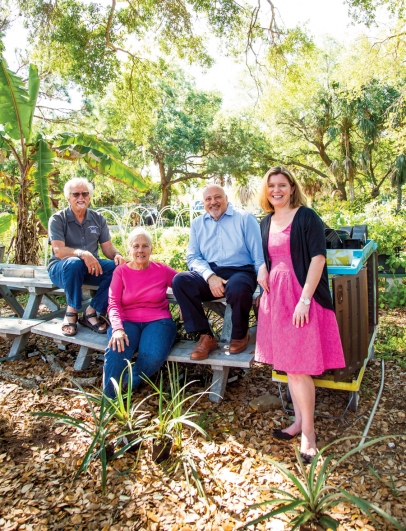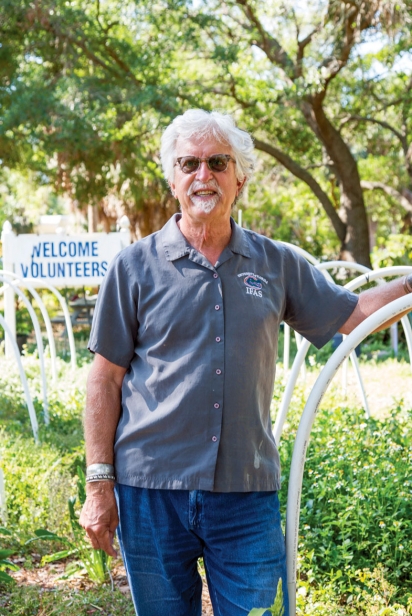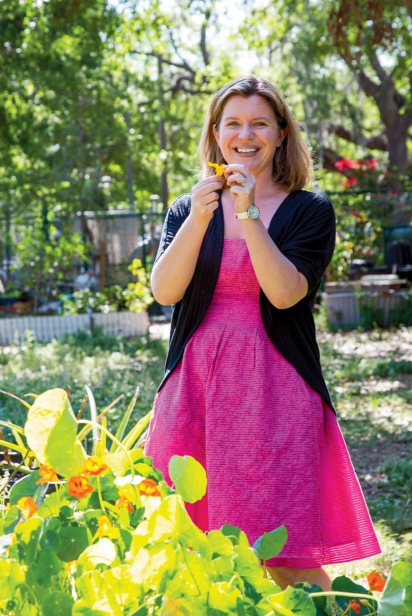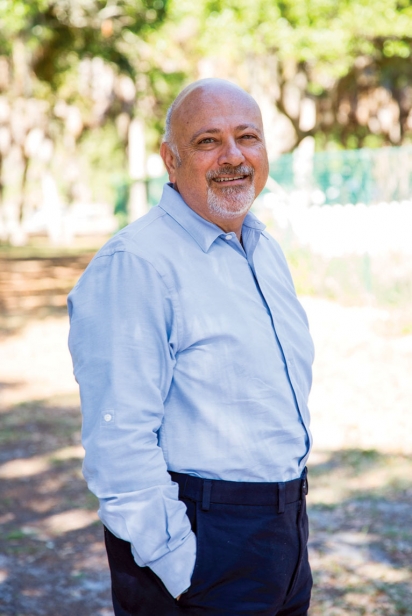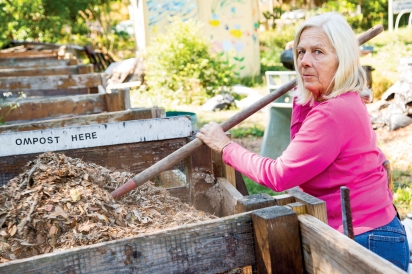Sustainability Superstars
Sarasota and Manatee counties have modeled sustainability in the state of Florida, demonstrating a devotion to going green well before it was the new hip shade. Meet four people who helped put our community a head above the crowd, and whose work continues to keep us ahead of the curve.
ROBERT KLUSON
AGRI-ADVOCATE
“The way I see it is, there are many ways to practice sustainability,” says Robert Kluson. “The trick is finding the one that people have a passion about.”
It seems that was far from tricky when, 13 years ago, Kluson landed his “dream job” as the agricultural and natural resources agent for the UF/IFAS Sarasota County Extension.
“Sarasota County is looked upon by all of my colleagues as one of the most desirable counties to come and work for,” Kluson says. “I’ve never been tempted to go for another position in any other county, because I’ve not found another that likes to be as much of a leader in sustainability as Sarasota County.”
Kluson grew up a globetrotter. Being part of a military family immersed him in a new culture every couple of years, where he was often exposed to traditional methods of growing and raising food. Kluson entered college during the heyday of the ’70s “back to the land” movement.
“I found myself visiting commune farms, doing food gardening and vegetarian cooking, and all of that really lit a fire inside of me. That, then, made me want to go check out this wide world of agriculture.”
After earning a master’s degree in agronomy and crop science, Kluson’s career took him into the U.S. heartland, where his eyes opened to what he calls agriculture’s “dark side.”
“We’re talking the early ’80s, and it was sad times for agriculture. There were rural farms and towns going belly-up. … I was reading about extra-high levels of cancer in farmers and their families; suicide rates, because they were having their farms foreclosed on. That really turned my whole world upside down, into my understanding about agricultural sustainability. Ironically, my company was having a lot of business, but with bigger agriculture—the ones who were benefiting from all this turmoil in the heartland. I didn’t like that at all.”
Kluson decided to reject an “ivory tower” of agricultural science, and through a progressive doctorate program in agroecology, he found his passion connecting to people working in agriculture and their reality on the ground.
“I would be visiting and living in the farming communities, so it was just so exciting and so full of life,” Kluson remembers. “We were figuring out problems as the farmers and communities defined them. That’s what I’ve been trying to do here in Sarasota County—and, actually, all of Florida.”
Looking back on some of his accomplishments with the Extension— leading the formation of the Sarasota Food Policy Council; incubating farm-to-school programs in Sarasota, Manatee, and Charlotte counties; orchestrating changes to Sarasota’s Comprehensive Plan that open county-owned property to more community gardens, farmers’ markets, and even small farms—Kluson’s retirement on August 1 will be a bittersweet day for the Extension and Kluson alike. But he plans to get back to globetrotting, exploring the world’s sustainability models for farms and food systems, and reporting back here on all he discovers.
STEVIE FREEMAN-MONTES
SUPER-COLLABORATOR
May 2015: The City of Sarasota had been missing a sustainability manager for a year and a half. The position in the City Manager’s office waited vacant for a perfect fit: someone with a devotion to environmental stewardship instilled by hands-on experience. Someone with a passion for local government. Someone who dreamed of marrying that passion with a marine ecosystem.
That someone was Stevie Freeman-Montes.
Freeman-Monte s won’t let a conversation about her work begin without insisting it’s a team effort. She has high praise for the enthusiasm and support sustainability initiatives receive all the way down the line, from the elected City Commissioners, who in January unanimously approved a Climate Adaptation Plan coordinated by Freeman-Montes; to the ardent activist residents who “show up and ask us to work on issues. They demand it,” she says, “and I appreciate that.”
“I’m really proud of this city,” Freeman adds. “I’m proud of living here and all the things we’re doing. But there is a side of me that knows how much more we need to do. I’m genuinely torn inside—yes, we’ve come a long way, and we have some really exciting projects implemented, but there definitely is a lot more I want to work on.”
Led by Freeman-Montes, the City’s sustainability initiatives aggressively targeted climate change response and mitigation for the past several years. But as of last winter, in response to that aforementioned activist force, the City of Sarasota made a commitment to 100% renewable energy, citywide, by 2045. City operations have promised to make the transition by 2030, and aim to get to 50% by 2024—which, Freeman- Montes will agree, is awfully soon.
Freeman-Montes’ gifts as a connector and collaborator have facilitated several “Ready for 100” meetings, uniting stakeholders from diverse community sectors— even Florida Power and Light has come to the table. So far, the meetings have produced more than a dozen sustainability strategies sourced directly from community feedback, and analyzed them to determine which offer the greatest impact as they push the needle to the ultimate goal.
“We want to reach 100% renewable energy, but we want to prioritize those things that create local jobs,” Freeman-Montes says. “We know that’s more sustainable in the long run. Same with social equity: We asked, ‘Does this strategy specifically assist historically underserved communities?’ We know it can’t be just the wealthy to transition. We need everybody to be able to transition to 100%.”
She may not like the spotlight, but with Freeman- Montes on the scene (in front or behind), Sarasota’s sustainability movement promises to be inclusive, cooperative, visible, and, most importantly, efficacious
BARBARA POWELL HARRIS
LOCAVORE CHAMPION
On any given day at the Orange Blossom Community Garden (OBCG), you’ll meet garden coordinator Barbara Powell Harris among the blooms and lush, leafy greens. When she’s not counseling one of the 30-plus members on organic pest control, or feeding the hungry worms in the kiddie-pool-sized vermicomposting trays, or processing hundreds of pounds of food waste into soil amendment—when she’s not toiling away at one of the myriad tasks that keep OBCG flourishing year-round—you’ll usually find Barbara surrounded by a knot of curious children.
And what’s that they’re munching on? Is that broccoli? Is that … chard??
OBCG draws residents from all over town to grow food in its fertile beds, but Powell Harris pays special attention to the kids who trickle in from the surrounding Newtown community. She knows well how young palates get excited to taste food they’ve had a hand in growing, and she dedicates a couple of raised beds to teaching anyone who wanders in how to garden.
“One of the best things ever, though, was several years ago, right after we got the compost bins,” Powell Harris recalls. “One afternoon I drove up, and three little boys were watching for me. They’re, like, ‘Barbara, Barbara, Barbara! Guess what? We’re studying about composting at school, and nobody else knew what it was—we got to tell ’em!’ It made my day.”
About a decade back, Powell Harris turned to the second page of a local news rag to find a two-sentence announcement embedded in a doggie dining feature: The Rosemary Community Garden, where she worked as a Master Gardener, was going away. The City of Sarasota was re-appropriating the property to build apartments.
Powell Harris and fellow Master Gardener Gail Harvey rallied a green-thumbed army that collected signatures, packed City Commission meetings, and essentially moved mountains—at least, they moved their beloved garden to its current home behind Orange Avenue Park. While it was far from easy, the relocation turned out to be a boon, expanding the garden for more garden plots, a children’s garden like a fairy tale scene, a composting operation that diverts more than 20,000 pounds from the dump each year, and an experimental plot for the Green Path Veterans Farm project to extend therapeutic, social, and skill-building opportunities to vets in the area.
“Local food is one of my passions, and making people aware of what is local,” Powell Harris says. And with everything she digs into at OBCG, Powell Harris leads by example to show people of all ages and backgrounds the food-producing powers they, too, hold in their hands.
VINCE ALBANESE
TRUST FORGER
In 2007, Albanese became a household name for the green movement when Vince, his brother Jeff, and cousin Mark Maksimowicz were named national heroes by People Magazine, Reader’s Digest, and CNN. In its first full year of operation, their nonprofit group Green Armada had pulled 62 tons of trash by hand from Tampa Bay area waterways. For the Albanese family, this fight against environmental pollution was personal.
“I lost a younger sister at 23 years old,” Albanese says. Cancer took her life after the Albanese family moved into their waterfront dream home in the Tarpon Springs area. They didn’t know about the property’s proximity to a Superfund chemical cleanup site. Albanese says the family will never know for certain what caused his sister’s illness, but “the link between the environment and us personally has been indelibly left on me. That led to the family trying to give something back.”
Albanese remains committed to fighting for Florida’s natural environment, bringing his deep background in information technology to bear in Manatee County sustainability projects. Albanese specializes in blockchain technology, a method of distributing data and recording transactions across a decentralized network of participants. A blockchain is hacker-proof and incorruptible by design, making it an ideal vehicle for medical records, identity security, and digital currencies such as Bitcoin. But how does it apply to saving the environment?
“Manatee and Sarasota Counties are at the hub of what’s going to become a global effort to do this,” Albanese says, “because of local people there that get it: the ability to centralize and democratize data, in a way that they can trust and use it perpetually. That’s at the heart of everything we need in society, in my humble opinion, because everything is twisted.”
As the word “climate” next to “change” instigates political brawling amid thick accusations of “fake news,” Albanese sees an urgent need for transparency and accountability in data.
“You don’t know who or what to trust; it’s a very unsettling time,” he says. “But there is a solution for it.”
Albanese recognizes that the key to any sustainability initiative, especially where funding is concerned, is an ability to measure return on investment. And to do that requires an ironclad method of recording its progress and success. So if it sounds like overkill to harness the same technology holding Bitcoin’s entire ledger (and its worth in billions) for little Susie’s after-school litterbug patrol, well, the United Nations would disagree with you.
Albanese’s efforts to bring blockchain into the sustainability picture have led to a UN assignment to a task force of thought leaders who are tackling tourism in the next decade. It’s no secret that Florida’s natural beauty makes tourism the state’s number-one economic driver, with more and more visitors exploring ecotourist and agritourist attractions along with the theme parks and beach resorts.
“We have a chance to turn this area into a world-wide center of excellence around this,” Albanese says. “We’ll start to show how truth and transparency deliver bigger results.”


